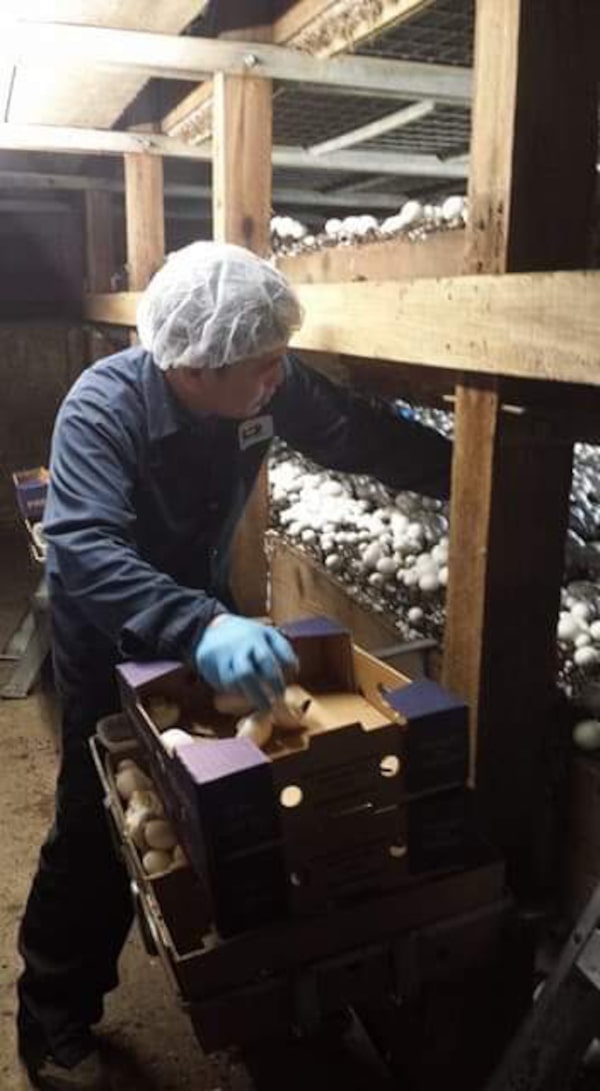
Jessie Veneranda is one of several Filipino migrants who worked at Ravine Mushroom Farm but now allege that a recruiter misled them.Handout
Four migrant workers, who say they were exploited by a recruitment agency and their former employer, are petitioning the Ontario government to regulate the recruitment and employment of workers like themselves.
“From Day 1, we knew we were underpaid, but we were vulnerable at that time,” said Marisol Bobadilla, at a news conference on Wednesday at a church in Toronto. “If we don’t do something, there will be more migrant workers who will be like us.”
Ms. Bobadilla and three other workers from the Philippines – Maila Ceguerra, Jesse Veneranda and Lourdes dela Pena – said Ontario needs to create a licensing system for recruitment agencies, as well as a registry of employers of migrant workers, similar to conditions in Manitoba, Nova Scotia and other provinces. Currently, Ontario does not require migrant-worker recruitment agencies to have licences, nor does the province have a registry of companies employing migrant workers.
The four workers said they collectively paid $82,000 to one recruitment agency, Link4Staff, which they allege promised them work permits, linked them to jobs at Ravine Mushroom Farms, then provided no work permits and deducted fees from their paycheques. They allege that the farm imposed exhaustive work hours and crowded living conditions. They recently filed a lawsuit against Link4Staff and Ravine Mushroom Farms in Ontario small-claims court.
Link4Staff not respond immediately to a request for comment.
Daniel Camenzuli, a lawyer for Ravine Mushroom Farms, said the company he represents acted in accordance with the law and employment standards.
The Ontario Ministry of Labour has no plans to create registries for recruitment agencies or employers of migrant workers, spokeswoman Janet Deline wrote in an e-mail. Ms. Deline said the province already has laws and regulations that protect foreign nationals, such as the Occupational Health and Safety Act, the Employment Standards Act and the Employment Protection for Foreign Nationals Act.
“The Ministry enforces these laws to ensure workers are protected and employers are in compliance,” Ms. Deline wrote by e-mail.
A Globe and Mail investigation found recruitment agencies and employers – along with private career colleges – are exploiting workers from countries including India and Mexico. Recruiters often give migrants false hopes of obtaining work permits, demanding thousands of dollars only to send them to employers who provide grim work and living conditions or college programs that do not lead to work permits. The agencies, employers and colleges face lawsuits across the country, accusing them of exploiting a collective 2,300 workers.
On Monday, federal Immigration Minister Ahmed Hussen promised to take action, but he did not offer specifics.
Along with asking for provincial oversight, the four workers say the federal government should grant permanent residency to all migrant workers upon landing in Canada.
Ethel Tungohan, Canada Research Chair in Canadian Migration Policy, Impacts and Activism, based at York University, supports calls to give permanent residency status to migrant workers upon arrival. She says a licensing system and registry of employers would not be enough to protect workers who are already here.
“They might be worried that, if we just rely on a database, that means that their own interests aren’t protected, so what will happen to them?" Ms. Tungohan says. “Does that mean that, if they were recruited illegally, that they will get amnesty from the Canadian government? Will they be able to stay in Canada? Or, ultimately, will they still have to be deported?”
The four workers, ages 41 to 45, have formed an organization called Justice for Mushroom 4. They came forward when Ms. Bobadilla got in contact with Migrante Ontario, an organization that advocates for migrant workers. During one of her two days off work a month, Ms. Bobadilla says, she bused from Vaughan to Toronto and met with staff from Migrante Ontario, which later connected her and her peers with lawyers who will work pro bono on their small-claims case.
The four workers plan to go door to door, asking people to sign a petition for migrant protection. They also plan to stand outside grocery stores, urging shoppers to mind which mushrooms they choose.